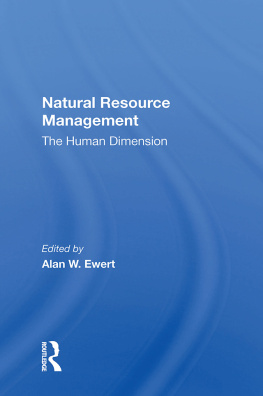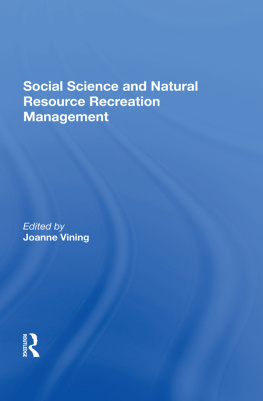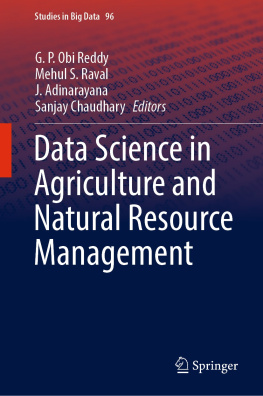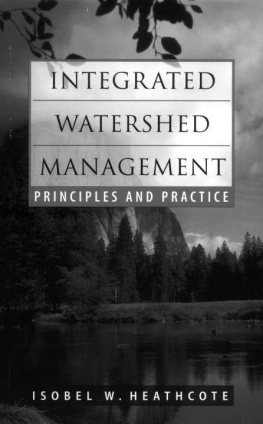SOCIAL SCIENCE IN NATURAL RESOURCE MANAGEMENT SYSTEMS
Social Behavior and Natural Resources Series
Donald R. Field, Series Editor
Social Science in Natural Resource Management Systems, edited by Marc L. Miller, Richard P. Gale, and Perry J. Brown
Community and Forestry: Continuities in Natural Resources Sociology, edited by Robert G. Lee, Donald R. Field, and William R. Burch, Jr.
Economic Valuation of Natural Resources: Issues, Theory, and Applications, edited by Rebecca L. Johnson and Gary V. Johnson
Social Science in Natural Resource Management Systems
Edited by
Marc L. Miller, Richard P. Gale, and Perry J. Brown
First published 1987 by Westview Press, Inc.
Published 2019 by Routledge
52 Vanderbilt Avenue, New York, NY 10017
2 Park Square, Milton Park, Abingdon, Oxon OX14 4RN
Routledge is an imprint of the Taylor & Francis Group, an informa business
Copyright 1987 Taylor & Francis
All rights reserved. No part of this book may be reprinted or reproduced or utilised in any form or by any electronic, mechanical, or other means, now known or hereafter invented, including photocopying and recording, or in any information storage or retrieval system, without permission in writing from the publishers.
Notice:
Product or corporate names may be trademarks or registered trademarks, and are used only for identification and explanation without intent to infringe.
Library of Congress Cataloging-in-Publication Data
Social science in natural resource management systems.
(Social behavior and natural resources series)
1. Conservation of natural resourcesGovernment policyUnited States. 2. Natural resourcesSocial aspectsUnited States. I. Miller, Marc L. II. Gale, Richard P. III. Brown, Perry J. IV. Series.
HC103.7.S62 1987 333.7'0973 87-23138
ISBN 13: 978-0-367-28762-7 (hbk)
Contents
M.L. Miller, R.P. Gale, and P.J. Brown
M.L. Miller, R.P. Gale, and P.J. Brown
D.R. Field and D.R. Johnson
M.L. Miller and R.P. Gale
L.N. Wenner
D.J. Decker, T.L. Brown, and G.F. Mattfeld
R.P. Gale and M.L. Miller
C.N. Taylor and C.H. Bryan
M.L. Miller, R.P. Gale, and P.J. Brown
E. Val
R. Graham, P.W. Nilsen, and R.J. Payne
S.D. Moore and S.K. Brickler
J. Vining and H.W. Schroeder
M.L. Miller, R.P. Gale, and P.J. Brown
S. Dennis
J. Rayner and D. Peerla
M.A. Shannon
The Social Behavior and Natural Resources Series is about human adaptation to natural resources and the constraints these resources place upon institutions and work and play in everyday life. Natural resources, after all, are products of society. The very definition of natural resources arises from the interaction of population, culture, and the biophysical environment.
Biological and physical scientists are providing us with a clearer picture of the nature of species and habitats and the requirements of systems to function under varying management regimes dedicated to conservation and preservation. Social scientists are providing complementary information about the human species, our habitat, and how social systems respond to a wide range of resource management policies.
The integration of social with the biological and physical world is the focus of this series. The present book is about the conduct and contributions of applied social science.
It is apropos that this be the inaugural volume in the series. Resource management issues are human problems which can only be solved with social science knowledge in combination with knowledge from the other sciences. The utilization of these different types of knowledge within the resource management arena depends upon the establishment of a partnership between scientists and managers. Sound management requires agreement on what information is pertinent, how information should be collected, and how information should be employed in decision making.
Here the social sciences can help. Social scientists have a keen appreciation of the power, as well as the limitations, of science to resolve policy conflicts. This is important for understanding how managers filter the concerns of competing constituencies and their own professional cadre while managing the natural resources under their charge.
There are many applied science volumes in sociology, anthropology, and political science that deal with post-industrial society, but this volume is unique in its exclusive attention to natural resources. Social Science in Natural Resource Management Systems represents the beginning of a new intellectual tradition in applied social science.
Donald R. Field
Social Science in Natural Resource Management Systems is the result of a lucky combination of personalities, events, and opportunities. Until several years ago, we three editors had independently designed our careers at three universities in the Pacific Northwest. In this, each of us forged an association with a different natural resource management system. Thus, one of us studied the management of marine fisheries, another addressed forest policy, while the third focused on parks and recreation.
In the course of our work, we all reached the conclusion that social science was highly relevant to natural resource management. We also discovered that although natural resource science was formally pluralistic, it was predominantly a natural science enterprise. In this milieu, we began to appreciate the need for interdisciplinary research. At the same time, we felt a certain sociological deprivation in the sense that few professionals in our various natural resource arenas were trained in the social sciences. Even rarer were social scientists who were interested in cross-natural resource management system studies.
In 1983, Gale spent his sabbatical at the University of Washington and began to collaborate with Miller. In short order, the utility of a comparative approach to natural resource problems became apparent. In 1986, the First National Symposium on Social Science in Resource Management was held in Corvallis, Oregon. At this event, Donald R. Field had the idea for a series of edited volumes treating social behavior and natural resources. He brought Miller and Gale together with Brown and gave the three of us the opportunity to consolidate the thought of social scientists at the symposium.
The purpose of Social Science in Natural Resource Management Systems is to foster exchange among the variety of social scientists who are concerned with natural resource policy. To this end, 23 authors have cooperated to prepare 14 articles reporting on the management of forests, parks marine fisheries, wilderness, and wildlife. Drawing examples from the United States, Canada, and New Zealand, the authors consider the major aspects of the application of social science to natural resource problems.
The plan of the volume is simple. A first section illustrates the concept of a natural resource management system and introduces the role of social science. A second section is composed of six articles which identify the mandate for applied social science and examine the status of natural resource sociology. A third section is composed of four articles which illustrate direct applications of social science to natural resource management. A final section is composed of three articles which evaluate the behavior of management bureaucracies in natural resource systems.










